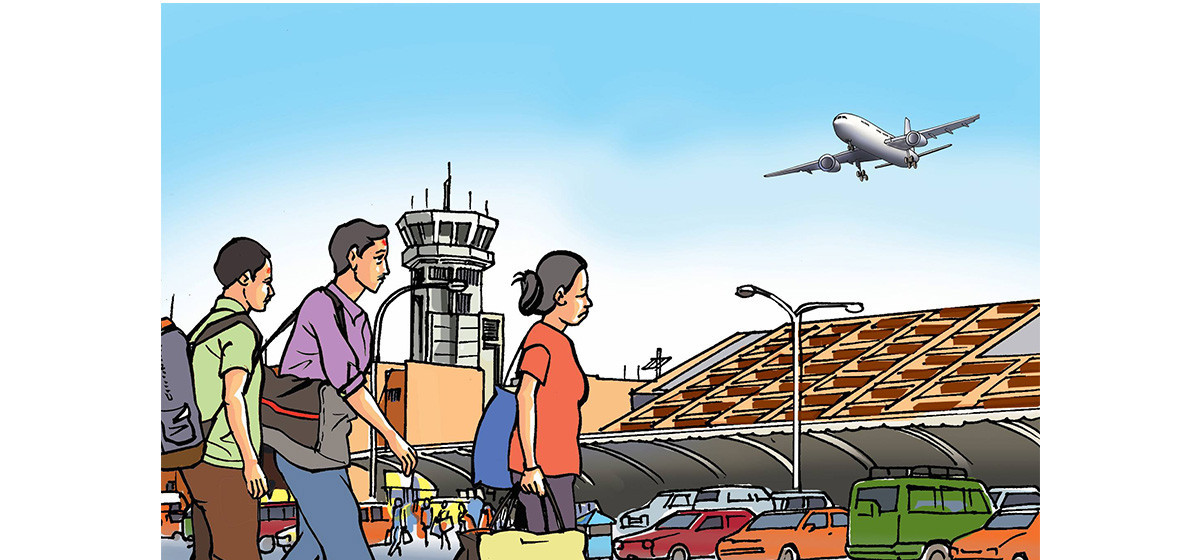
OR

Mukesh Baral
The author is Cofounder at Advocacy for Refugee and Immigrant Services for Empowerment (ARISE), a nonprofit organization based in Massachusettsmukeshbaral@yahoo.com
My daughter’s future, like the future of her minority friends, depends on policies Trump and his Congress now enact
On December 7, President Donald Trump ordered his Twitter followers to buy a book on Andrew Jackson written by Brian Kealmeade. In doing so, Trump was not only promoting a writer of his taste, but also reselling his favorite president, Andrew Jackson, best remembered for his anti-Indian and anti abolitionist stance. Jackson through the Indian Removal Act violently pushed the Native Americans out to the west of Mississippi.
So why is the president who has been accused of dog-whistling White supremacist groups time and again projecting himself as a diehard Jackson fan?
Elephant in the room
In 2016, I enrolled my daughter at a school in the US. Interestingly, 2016 was also the year when American schools enrolled more ethnic minority kindergarteners than whites. All minorities combined—Asians, Hispanics, Blacks, and others—became a majority in kindergarten. This was expected, because in 2012, the census bureau recorded that 50.4 percent born that year were non-white. According to a projection, by 2020, there will be more under-18 non-white children than there will be white children. By, 2042, whites in America will seize to be majority voters. The demographic shift is real and America is browning faster than anticipated.

But the American window that opens to the world still projects a white face of America. Those minority kids, who became a majority in kindergarten a couple of years ago, have parents. America right now is not that white. America is diverse. The picture projected to the world is missing the spectrum of this diversity.
White wash
Browning of America means more political power in the hands of minorities. That is making some people on the far right nervous. Some white nationalists are alarmed by this. Donald Trump in 2016 flipped the data on demography into red meat for his white base. Things are built on fear in America. Americans spend billions of their hard-earned dollars buying insurances that they never use. As a businessman Trump understood the underlying culture of fear well. Trump manufactured and exploited fear and sold it to white voters.
Trump cultivated the fight instinct of those fearful of changing demographics. He blamed ethnic and religious minorities for the miseries of the white working class. Those who were resisting change, fearful of losing their supremacy, got a perfect candidate in Trump.
The campaign of “Make America Great Again” provided a political stage for the largely angry non-college graduate white men, who were fearful of change. Sixty-seven percent non-college graduate whites voted Republican, a record-breaking feat. Only 28 percent of them supported the Democratic candidate, according to Pew Research Center. That is why many prominent black advocates see victory of Trump as a “white-lash”.
Effects of Trumpism
For minorities Trumpism means white supremacy and white control. Trump in a way sold an insurance policy of white privilege and white supremacy to those white nationalists who fear the browning of America. The major shifts in some issues—global warming, refugee resettlement, Iran nuclear deal, to cite a few—suggest that he could be following on Jackson’s footsteps, regardless of what the world thinks. That is a legitimate fear expressed by the minorities.
In October, the Homeland Security published a notice to collect social media feed on all immigrants and Green card holders, including naturalized citizens. Trump’s executive orders barring refugee at the entry point was brutal. So was the dumping of the Deferred Action for Childhood Arrivals (DACA) that is pushing 800,000 dreamers—who entered America as kids, through no fault of their own—back into the shadows. They don’t know any other country but America. Every crime committed by an immigrant is twisted by the White House to justify Trump’s anti-immigrant stance. It looks like he is on track to disrupt ‘browning’ of America, much like Jackson disrupted the emancipation of slaves for at least two decades.
The flow of refugee, primarily from Africa, has nosedived in past 10 months. There has been a spate of arrests of undocumented immigrants and throwing them out of America, even at the economic and psychological hardship of their America-born children. The ‘greatest country in the world’ is reportedly apprehending parents running from gang violence in South America and ripping their children off their bosoms at the border.
Trump administration even has a hotline to report suspected undocumented immigrants. Anyone can pick a phone and accuse a brown face of being undocumented, or even a gang member, and send immigrants and customs enforcement (ICE) officers to their doors. America is getting less and less tolerant to religious and ethnic minorities.
Impacts on Nepalis
The Asian population of America grew by 72 percent between 2000 and 2015, according to Pew Research Center. Out of the 19 Asian ethnic groups by origin, Bhutanese and Nepalis—95 percent and 88 percent respectively—witnessed the highest population growths. This growth was possible because of current immigration policy, largely because of Diversity Visa Program for Nepalis—through which 3,500 Nepalis entered the US just in 2014. This program is in the chopping block under the Trump administration.
Trump is also targeting immigration through family ties. It is going to impact thousands of Nepali Americans who are on track to sponsor their family members including their brothers and sisters. Nepalis in the US could also lose Temporary Protection Status (TPS) in coming days, like Haiti lost its status in November.
Thousands of Nepalis, even those who had overstayed their visas, took the opportunity of working legally and registered for TPS. The future of those who overstayed their visas is uncertain now. They could be packing their bags and crossing the Canadian border, just like hundreds of Haitians did after the Trump administration took Haiti off the TPS list.
Bhutanese population growth in America was the result of a generous refugee resettlement program that added 92,000 Bhutanese in a decade. After Trump’s executive action on refugees, Bhutanese resettlement has practically stalled and thousands are languishing in refugee camps, awaiting resettlement.
Since Bhutanese speak Nepali and are culturally similar—the very reason they were kicked out of Bhutan, and live in pockets in specific cities in their thousands—they are going to strengthen the cultural and linguistic fabric of Nepal there. But Trump’s plan to clamp down on immigration will cut the flow of Nepalis into the US. If that happens, it is going to impact Nepali shade of ‘brown’ to a great extent. Lot of new immigrants chose to stay in America because of the provision of sponsoring family members including siblings. If Trump took that off the table, staying in America won’t be attractive at all.
Fixed pie illusion
Without young immigrants, America won’t have the minds and muscles to continue to be the country it is today. The white child birth rate is not sufficient to keep America moving forward, without immigrants and refugees filling that gap. Minorities are part of the growth America has enjoyed for centuries. The perception of a fixed pie that Trump is selling to his base is a myth. The immigrants, minorities included, are boosting the economy and expanding the pie for all shades of America.
The future of America depends on how it treats its minorities and their future in turn will largely hinge on whether white majorities will be complicit in Trump’s divisive rhetoric or reject it. The overwhelming defeat of Trumpism, in Virginia and Alabama in recent elections, has given hope to all minorities. The 2018 midterm election will provide a better understanding as to where Trumpism stands.
My daughter’s future, like the future of her minority friends, depends on policies Trump and his Congress will enact in the days ahead. But America’s future also depends on whether millions of minorities, like me, will find it safe to raise their children without fear.
The author is Cofounder at Advocacy for Refugee and Immigrant Services for Empowerment (ARISE), a nonprofit organization based in Massachusetts
mukeshbaral@yahoo.com
You May Like This

Four Nepalis, three Indians held with 30 kg brown sugar
HETAUDA, July 23: Armed Police Force has nabbed seven people from a hotel in Hetauda for illegally possessing 30 kg... Read More...

Stranger Things star Millie Bobby Brown to star in Godzilla sequel
Actress Millie Bobby Brown is set to join the cast of Godzilla sequel. The Stranger Things star is set to... Read More...

NRB raises spending ceiling for Nepalis with Forex accounts
KATHMANDU, Aug 8: Nepal Rastra Bank (NRB) has raised the maximum limit that a Nepali with a foreign exchange account in... Read More...





Just In
- 120 snow leopards found in Dolpa, survey result reveals
- India funds a school building construction in Darchula
- Exploring opportunities and Challenges of Increasing Online Transactions in Nepal
- Lack of investment-friendly laws raises concerns as Investment Summit approaches
- 550,000 people acquire work permits till April of current fiscal year
- Fixing a win by outlawing dissent damages democracy
- MoHP cautions docs working in govt hospitals not to work in private ones
- Over 400,000 tourists visited Mustang by road last year










_20220508065243.jpg)

Leave A Comment